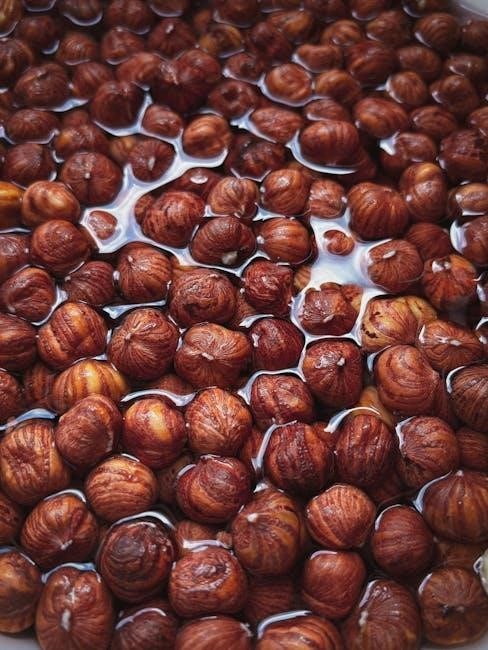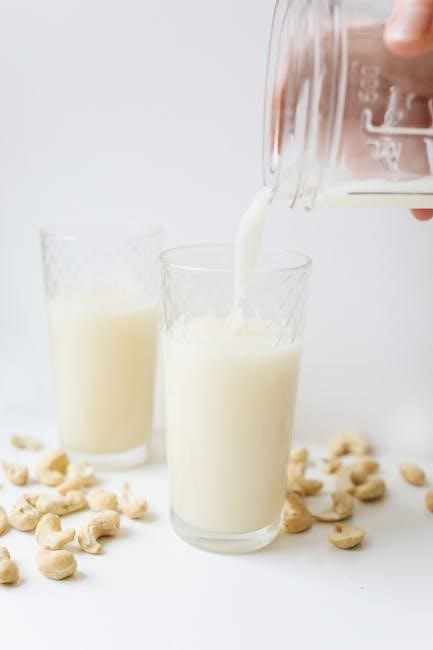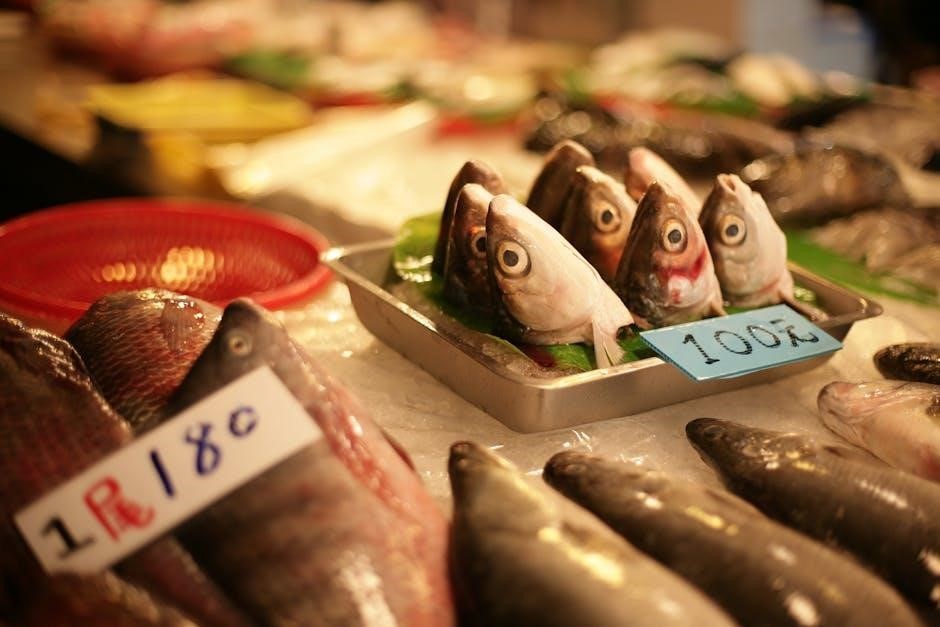Gastroenteritis is an infection causing inflammation of the digestive system, leading to symptoms like diarrhea and abdominal cramps. A gastroenteritis diet focuses on bland foods, hydration, and avoiding irritants to aid recovery.
1.1 Understanding Gastroenteritis
Gastroenteritis is an infection that inflames the digestive tract, primarily caused by viruses, bacteria, parasites, or contaminated food and water. Symptoms include diarrhea, abdominal cramps, nausea, and dehydration. It is often acute and self-limiting but can be severe in vulnerable populations like children and the elderly. Understanding the condition is crucial for managing symptoms and preventing complications. The focus is on restoring digestive health through appropriate dietary adjustments and hydration strategies, which are central to the gastroenteritis diet approach.
1.2 Importance of Dietary Management
Dietary management plays a crucial role in managing gastroenteritis, as it helps control symptoms like diarrhea and abdominal cramps. By focusing on bland, easily digestible foods, the digestive system can heal without additional strain. Proper nutrition supports hydration, prevents malnutrition, and accelerates recovery. Avoiding irritants like spicy, fatty, or high-fiber foods reduces discomfort and minimizes the risk of prolonged illness. A well-structured diet also helps restore gut health, making it essential for both children and adults to follow tailored dietary advice during recovery.

Phases of the Gastroenteritis Diet
The gastroenteritis diet follows a structured approach, starting with clear liquids, progressing to bland foods, and gradually introducing the BRAT diet to soothe the digestive system and promote recovery.
During recovery from gastroenteritis, introducing foods gradually is crucial. Start with easily digestible options like bananas, rice, applesauce, and toast, known as the BRAT diet. These foods are gentle on the stomach and help restore normal digestion. Clear liquids, such as broth and electrolyte-rich beverages, are also essential to prevent dehydration. Avoid spicy, fatty, or high-fiber foods that can irritate the digestive system. This phased approach ensures the gut heals properly and reduces the risk of prolonged symptoms.
2.2 Bland Foods and Their Role
Bland foods play a vital role in managing gastroenteritis by minimizing stomach irritation. Foods like bananas, rice, and applesauce are low in fiber and fat, making them easy to digest. These options help stabilize the digestive system and prevent worsening symptoms. Bland foods are recommended during the initial recovery phase to allow the gut to heal without additional stress. They provide essential nutrients while reducing the risk of further inflammation or discomfort.
2.3 The BRAT Diet

The BRAT diet consists of bananas, rice, applesauce, and toast, offering a gentle approach to nutrition during recovery. Bananas are rich in potassium and easy to digest, while rice is low in fiber, reducing stomach strain. Applesauce is soothing and non-irritating, and toast provides bland carbohydrates. This diet is ideal for the initial recovery phase, helping to settle the stomach and prevent further irritation. By focusing on these low-risk foods, individuals can gradually reintroduce nutrients without overwhelming their digestive system, promoting a smoother recovery from gastroenteritis.

Foods to Eat During Recovery
During recovery, opt for bland, easily digestible foods like bananas, rice, toast, and applesauce. These low-fiber, low-fat options help soothe the stomach and support healing.
3.1 Low-Fiber Foods
Low-fiber foods are gentle on the digestive system and essential during recovery from gastroenteritis. These include bananas, white bread, rice, and applesauce. Avoid whole grains and seeds, which can irritate the stomach. Opting for these foods helps reduce digestive strain, allowing the gut to heal more efficiently. Additionally, low-fiber foods are less likely to exacerbate symptoms like diarrhea or cramps, making them a crucial part of the recovery diet. They provide necessary nutrients without overwhelming the digestive tract, promoting a smoother and faster return to health.
3.2 Lean Proteins
Lean proteins are essential during recovery from gastroenteritis, as they provide necessary nutrients without straining the digestive system. Opt for foods like chicken, fish, eggs, and tofu, which are easy to digest. These proteins help rebuild tissues and support overall healing. Avoid fatty or fried meats, as they can worsen symptoms. Cook proteins plainly, without added fats or spices, to ensure they are gentle on the stomach. Incorporating lean proteins into meals helps maintain strength and aids in the recovery process without irritating the digestive tract further.
3.4 Easy-to-Digest Carbohydrates
Easy-to-digest carbohydrates are crucial during recovery from gastroenteritis, as they provide energy without irritating the digestive system. Opt for foods like white rice, pasta, boiled potatoes, and ripe bananas. These low-fiber, easily digestible options help stabilize digestion. Avoid processed or sugary carbs, as they can worsen symptoms. Incorporate these foods gradually to allow your digestive system to heal. Plain crackers and toast are also excellent choices, offering quick energy and soothing an upset stomach. They help manage diarrhea and support the body’s recovery process gently and effectively.

Hydration Tips
Maintaining hydration is vital during recovery. Oral rehydration solutions replenish lost fluids and electrolytes. Clear liquids like water or herbal teas also support hydration efforts effectively.
4.1 Oral Rehydration Solutions
Oral rehydration solutions (ORS) are essential for replenishing fluids and electrolytes lost due to diarrhea and vomiting. These solutions balance sodium and glucose to promote absorption. Pre-made ORS packets are ideal, but homemade versions can be made with 1 liter of water, 1/2 teaspoon salt, and 1/4 teaspoon baking soda. Sip small amounts gradually to avoid overwhelming the stomach. ORS is particularly crucial for children and individuals with severe dehydration. Always opt for pre-made solutions if available, as they ensure the correct electrolyte balance. Proper hydration prevents complications and supports recovery effectively.
4.2 Clear Liquids
Clear liquids are a cornerstone of hydration during gastroenteritis recovery. Water, clear broths, herbal teas, and electrolyte-rich beverages like coconut water or sports drinks are ideal. These liquids replenish lost fluids and electrolytes without overwhelming the digestive system. Start with small sips and gradually increase as tolerated. Avoid sugary or caffeinated drinks, as they can worsen dehydration. Clear liquids help maintain hydration levels, reducing the risk of complications. They are particularly beneficial when solid foods are not yet tolerable, ensuring the body receives essential nutrients for recovery.

Foods to Avoid
Avoid spicy, fatty, high-fiber, and heavy foods, as they can irritate the digestive system and worsen symptoms like diarrhea and abdominal discomfort during recovery.
5.1 Spicy and Fatty Foods
Spicy and fatty foods can irritate the digestive system, worsening symptoms like diarrhea and abdominal cramps. These foods are hard to digest and may prolong recovery. Avoid dishes with heavy sauces, fried items, or excessive spices, as they can cause discomfort. Opting for bland, low-fat options helps reduce digestive strain. It’s important to steer clear of these foods during the acute phase of gastroenteritis to allow the digestive system to heal. Transitioning to gentler foods supports a smoother recovery process, which is crucial for managing the condition effectively.
5.2 High-Fiber Foods
High-fiber foods, such as whole grains, beans, and cruciferous vegetables, can irritate the digestive system during gastroenteritis. They are harder to digest and may worsen diarrhea or discomfort. Avoiding these foods temporarily allows the digestive tract to heal. Opt for low-fiber alternatives like bananas, applesauce, or white rice instead. While fiber is beneficial for long-term health, it should be reintroduced gradually after recovery. Sticking to a low-fiber diet during illness helps manage symptoms and supports the digestive system’s recovery process effectively.

Specific Dietary Needs
Dietary needs vary by age and health status. Pediatric diets focus on mild, easily digestible foods, while adult diets may include managing conditions like acid reflux or dehydration.
6.1 Pediatric Considerations
Managing gastroenteritis in children requires careful attention to prevent dehydration and ensure proper nutrition. The BRAT diet—consisting of bananas, rice, applesauce, and toast—is often recommended for its bland, easily digestible nature. Pediatric diets should focus on small, frequent meals and avoid spicy or fatty foods. Oral rehydration solutions are crucial to replenish lost fluids and electrolytes. Parents should monitor for signs of severe dehydration, such as dry mouth or reduced urine output, and seek medical advice if symptoms persist or worsen. Additionally, breastfeeding or formula feeding should continue to support recovery in infants.
6.2 Adult and Geriatric Considerations

Adults and geriatric patients with gastroenteritis require tailored dietary approaches to manage symptoms and support recovery. Emphasize bland, easily digestible foods like lean proteins, low-fiber options, and steamed vegetables. Avoid spicy, fatty, or high-fiber foods that may worsen symptoms. Hydration is critical, especially in the elderly, who may be more susceptible to dehydration. Encourage small, frequent meals to ease digestion. For older adults, soft or pureed foods may be beneficial. Monitor for complications like electrolyte imbalances or prolonged diarrhea. Consult healthcare providers for personalized advice, particularly for those with chronic conditions or compromised immune systems.
Lifestyle Tips
Rest is essential for recovery. Manage stress through relaxation techniques and ensure adequate sleep. Avoid smoking and alcohol, which can irritate the digestive system further.
7.1 Rest and Stress Management
Rest and stress management are crucial during gastroenteritis recovery. Aim for 8-10 hours of sleep nightly to support immune function. Practice relaxation techniques like deep breathing or meditation to reduce stress, which can worsen symptoms. Avoid stimulants like caffeine and nicotine, as they can irritate the digestive system. Create a calm environment to promote healing. Stress management helps stabilize digestion and prevents complications. Prioritize rest to allow your body to recover effectively and rebuild strength. This holistic approach supports overall well-being during recovery.

Monitoring Symptoms
Monitor symptoms like diarrhea, vomiting, and dehydration. Track stool frequency, consistency, and presence of blood or mucus. Note fever duration and severity of abdominal pain.
8.1 When to Seek Medical Attention
Seek immediate medical attention if symptoms worsen or persist beyond a few days. Severe dehydration, bloody stools, or high fever require urgent care. Persistent vomiting, inability to keep fluids down, or signs of electrolyte imbalance (e.g., confusion, rapid heart rate) are concerning. If diarrhea lasts more than a week or is accompanied by severe abdominal pain, consult a healthcare provider. Additionally, individuals with underlying conditions like heart or liver disease, or those with weakened immune systems, should seek medical advice promptly. For children, elderly, or frail individuals, early consultation is crucial to prevent complications.
A well-structured gastroenteritis diet is essential for managing symptoms and promoting recovery. By focusing on bland, easily digestible foods, staying hydrated, and avoiding irritants, individuals can alleviate discomfort and prevent complications. The BRAT diet and low-fiber options are particularly beneficial. Monitoring symptoms and seeking medical attention when necessary, especially for severe cases or vulnerable populations, is crucial. Adhering to these dietary guidelines helps restore digestive health and supports overall well-being. Proper nutrition plays a vital role in overcoming gastroenteritis and reducing the risk of prolonged illness. Always consult healthcare professionals for personalized advice, particularly for severe or persistent cases.